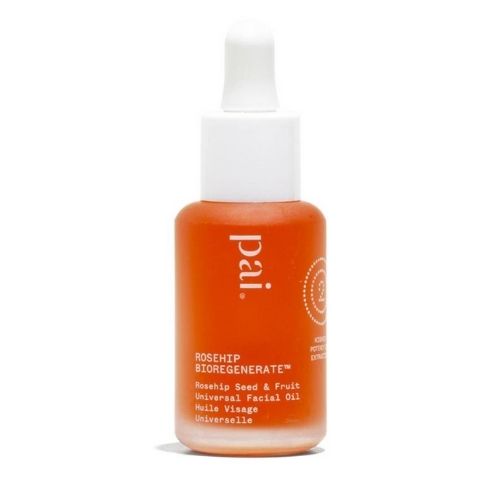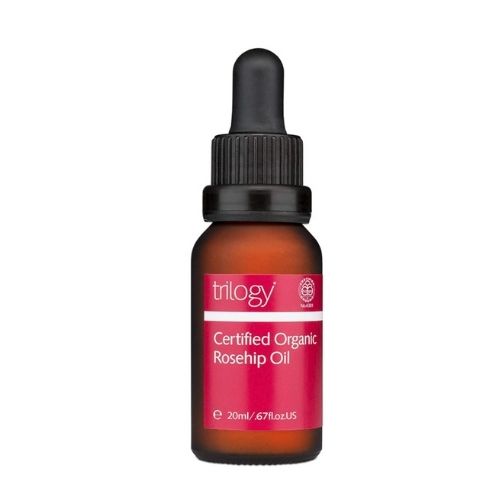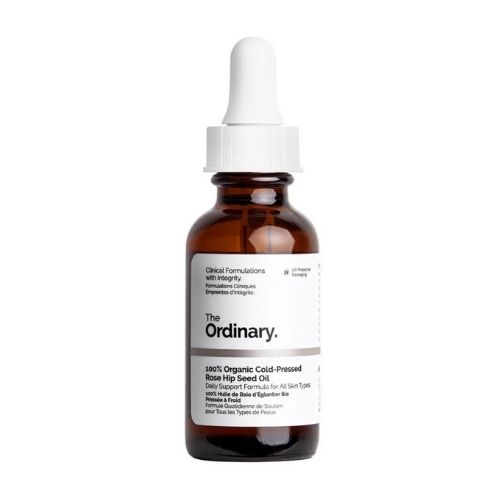Oils and acne have been heavily debated. One of the most talked-about oils over the past few years is rosehip oil, sometimes referred to as a miracle in a bottle.
But is it worth the hype?
Does rosehip oil clog pores?
Does it help to clear up your acne or does rosehip oil clog your pores?
What is rosehip oil?
Rosehip oil comes from plants in the Rosaceae family and is pressed from the fruit and seeds of the rose plant.
It is full of skin-nourishing vitamins and essential fatty acids.

| this post may contain affiliate links, which means if you purchase from one of these links, I may receive a small commission at no additional cost to you. |
Rosehip oil contains a high amount of linoleic acid (omega 6 fatty acid) which helps your skin retain moisture, plump fine lines and wrinkles, fight sun and pollution damage, brighten your skin tone, reduce redness, soothe inflammation, and leave your skin baby soft.
Rosehip oil is non-comedogenic which means it shouldn’t clog your pores and cause breakouts.
However, it shouldn’t be your go-to acne treatment because it is still oil.
Oils can form an oily barrier on your skin that’ll make it look greasy, clog your pores, and potentially make your acne worse,
Does rosehip oil have side effects?
With anything there’s always the possibility of an allergic reaction, however, severe side effects from using rosehip oil are rare.
Common symptoms of an allergic reaction are:
- rash or hives
- wheezing
- watery eyes
- chest discomfort
- dizziness
Should you use rosehip oil if you have acne-prone skin?
You may have heard that rosehip oil is a natural wonder for your skin.
It’s full of vitamins, antioxidants, and fatty acids that can moisturize, brighten and heal your skin.
But what if you have acne-prone skin?
Can rosehip oil help you clear your breakouts and fade your scars? Or will it make your skin worse? Let’s find out.
Advantages of using rosehip oil
First of all, rosehip oil isn’t the same as rose oil. Rose oil comes from rose petals, while rosehip oil comes from the fruit and seeds of the rose plant.
They have similar benefits, but rosehip oil has more vitamin A (a natural retinoid that can help regulate your oil production and speed up your cell turnover) and linoleic acid (an omega-6 fatty acid that can help balance your skin’s natural oil), which are important for acne-prone skin.
This means less clogged pores and fewer blackheads and whiteheads. Vitamin A can also help reduce inflammation and redness from acne.
Studies show that people with acne tend to have lower levels of linoleic acid in their skin, which makes their oil thicker and stickier.
This can lead to more clogged pores and breakouts. Linoleic acid can help thin out your oil and prevent it from blocking your pores.
Rosehip oil also has vitamin C, vitamin E, lycopene and other antioxidants that can protect your skin from free radical damage and boost your collagen production.
This can help improve your skin elasticity and texture, as well as fade dark spots and scars from acne.
So far, so good. Rosehip oil sounds like a great natural remedy for acne-prone skin.
But there’s a catch.
Disadvantages of using rosehip oil
Rosehip oil is still an oil. And oils can sometimes cause problems for acne-prone skin.
For one thing, oils can create an oily barrier on your skin that can trap dirt, bacteria and dead skin cells underneath.
This can make your skin look greasy and dull, and potentially worsen your acne.
For another thing, oils can sometimes trigger a purging effect on your skin.
This means that they can bring out all the impurities and congestion that are hiding under your skin’s surface.
This can cause more breakouts in the short term before your skin clears up.
So how do you know if rosehip oil is right for you?
The truth is, it depends on your skin type and how you use it. Rosehip oil may work better for some people than others.
It may also work better for certain types of acne than others.
Rosehip oil may be more effective for inflammatory acne than noninflammatory acne.
Inflammatory acne includes pimples that are red, swollen and filled with pus, such as papules, pustules, nodules and cysts.
Noninflammatory acne includes clogged pores that are not inflamed, such as blackheads and whiteheads.
Rosehip oil may also be more effective for flat, dark-colored scars than depressed or raised scars.
Flat scars are caused by hyperpigmentation or loss of pigment in the skin after acne heals.
Depressed or raised scars are caused by damage or excess tissue in the deeper layers of the skin after acne heals.
If you want to try rosehip oil for your acne, here are some tips to use it safely and effectively:
- Patch test first. Before applying rosehip oil to your face, test it on a small area of your skin, such as behind your ear or on your inner arm. Wait for 24 hours to see if you have any allergic reaction or irritation.
- Use pure rosehip oil. Look for organic, cold-pressed rosehip oil that does not contain any additives or preservatives. This will ensure that you get the most benefits from the oil without any unwanted chemicals.
- Use it sparingly. A little will go a long way with rosehip oil. You only need a few drops to cover your entire face. Too much oil can make your skin too oily and clog your pores.
- Use it at night. Rosehip oil can make your skin more sensitive to sunlight, so it’s best to use it at night before bed. In the morning, wash your face with a gentle cleanser and apply sunscreen to protect your skin from UV damage.
- Use it with other products. Rosehip oil alone may not be enough to treat your acne-prone skin. You may need to use other products with ingredients that can target acne at its source, such as salicylic acid, glycolic acid or azelaic acid. You can use these products before or after applying rosehip oil, depending on their instructions.
- Be patient. Rosehip oil may take some time to show results on your skin. It may also cause some initial purging or breakouts before it clears up your skin. Give it at least 6 to 8 weeks to see if it works for you.
Rosehip oil is a natural treatment for acne-prone skin that has many benefits but also some risks.
It may help reduce inflammation, redness, and scarring from acne, but it may also cause more oiliness, clogging, and purging on your skin.
The best way to find out if rosehip oil works for you is to try it yourself with caution and care.
Always patch test first, use pure rosehip oil sparingly at night, combine it with other products, and be patient with the results.
And as always if you have any questions or concerns about using rosehip oil for your acne-prone skin, talk to your dermatologist or skincare professional before starting.
How rosehip oil can benefit your skin
Rosehip oil is rich in vitamins, antioxidants and fatty acids that can nourish, moisturize and heal your skin.
Here are some of the benefits you can get from using rosehip oil:
- It can help heal your skin. Rosehip oil has vitamin A, which can stimulate collagen production and speed up cell turnover. This can help reduce inflammation, redness and scarring from acne. It also has vitamin C, which can protect your skin from free radical damage and boost your skin regeneration. It can also help fade dark spots and scars from acne.
- It can help prevent aging. Rosehip oil can also help improve your skin elasticity and texture by increasing collagen and elastin production. This can help smooth out fine lines and wrinkles and give you a more youthful complexion. It can also hydrate your skin and prevent dryness.
- It can help exfoliate and brighten your skin. Rosehip oil has vitamin A, which can act as a gentle exfoliant. It can help remove dead skin cells and unclog pores. It also has vitamin C, which can inhibit melanin production and lighten dark spots. This can give you a more even and radiant skin tone.
- It can help soothe your skin. Rosehip oil has vitamin E, polyphenols and anthocyanins, which have anti-inflammatory properties. They can help calm stressed-out skin and prevent redness and irritation. This makes it ideal for people with sensitive or dry skin. It also has anti-bacterial properties that can help fight acne-causing bacteria and prevent breakouts.
The best rosehip oils for your face and how to use them
Not all rosehip oils are created equal. You want to look for organic, cold-pressed rosehip oil that does not contain any additives or preservatives.
This will ensure that you get the most benefits from the oil without any unwanted chemicals.
To help you find the best rosehip oil for your face, we’ve rounded up some of the most popular and highly rated products on the market.
Here are my top picks and how to use them:
1. Pai Skincare Rosehip BioRegenerate Oil

This oil is a cult favorite that contains a blend of both extracts from rosehip fruit and seed.
It’s made with organic ingredients and has a beautiful orange color.
It can improve the condition of your skin, protect it from free radicals and provide nutrients for healthy-looking skin. It can also reduce acne, prevent dryness and soften your skin.
To use it, apply 2-3 drops to clean, dry skin at night. Massage gently until absorbed. You can also mix it with your moisturizer or serum for extra hydration.
2. Trilogy Certified Organic Rosehip Oil

This oil is a favorite of beauty editors, Amazon reviewers, and celebrities alike.
It’s certified organic, cold-pressed, and tested to contain over 80% of the fatty acids omegas 3, 6, and 9. These fatty acids work to moisturize dry skin, improve skin elasticity and texture and reduce signs of aging.
To use it, apply 2-3 drops to clean, damp skin morning and night. Massage gently until absorbed. You can also add it to your moisturizer or foundation for a dewy glow.
Buy it online on Amazon.
3. The Ordinary 100% Organic Cold-Pressed Rose Hip Seed Oil

Of course, a favorite affordable skincare brand has come through with amazingly good rosehip oil.
This oil is an affordable option that offers high-quality products. It’s organic, cold-pressed, and packaged with UV protection to prevent oxidizing.
It preserves the natural antioxidants and fatty acids found in rosehip oil, which can help repair your skin, soothe your body and reduce inflammation.
To use it, apply a few drops to clean, dry skin once or twice a day. Massage gently until absorbed. You can also mix it with other products from The Ordinary for a customized skincare routine.
Buy it online at SkinStore.
How to get the most out of rosehip oil
Rosehip oil can do wonders for your skin, but you need to use it the right way. You can find rosehip oil in different forms, like creams, oils or pills. But which one should you choose?
Well, you can start by trying rosehip oil on your skin.
Just apply a few drops to your face or body every day and see how it works for you. You should notice some changes in your skin within 6 to 8 weeks.
But if you don’t see any improvement, don’t give up. You can also take rosehip oil as a supplement.
This can help boost your skin health from the inside out. But before you do that, make sure you talk to your doctor first.
They can tell you if rosehip oil is safe for you and how much you should take.
Rosehip oil is a natural and effective way to care for your skin. But you need to use it correctly and consistently.
How to tell if rosehip oil is working
You might be wondering if rosehip oil is working for you and how to tell if it’s still good.
Here are some tips to help you out:
- To see if rosehip oil is working for you, you need to use it consistently and give it some time. Rosehip oil can help with various skin issues, such as acne, scars, wrinkles, dark spots and more. But it may take 6 to 8 weeks or longer to notice any improvement. Be patient and keep track of your progress.
- To see if rosehip oil is still good, you need to check its smell, color and texture. Rosehip oil can go rancid if it’s exposed to air, light or heat for too long. Rancid oil can smell musty and sour, lose its vibrant orange color and become thicker or cloudy. If you notice any of these signs, it’s best to toss it out and get a new one.
- To keep your rosehip oil fresh and effective, you need to store it properly and use it wisely. Rosehip oil should be kept in a cool, dark place, preferably in its original box or in a dark glass bottle. It should also be sealed tightly after each use and used within 6 months of opening. You can also look for rosehip oil that has natural vitamin E added to it, which can prolong its shelf life and protect your skin from damage.
Follow these tips and you’ll be able to enjoy the benefits of rosehip oil for longer.
FAQs
Does rosehip oil get rid of acne?
You may have heard that rosehip oil can help with acne, but that’s not really true. Rosehip oil can moisturize your skin and calm down some redness and inflammation, but it won’t get rid of your acne.
That’s because rosehip oil doesn’t address the root causes of acne, such as excess oil, clogged pores, bacteria, and hormones.
To do that, you need products with ingredients that can target acne at its source, such as salicylic acid, glycolic acid, or azelaic acid.
These ingredients can exfoliate your skin, unclog your pores, kill bacteria, and reduce inflammation.
If you’re looking for a natural oil that can help with acne, you might want to try some Korean cleansing oils. These oils are designed to dissolve makeup, dirt, and oil from your skin without stripping it of moisture.
They can also help balance your skin’s pH and prevent breakouts. Some of them even contain anti-acne ingredients like tea tree oil or green tea extract.
Rosehip oil is a great natural oil for your skin, but it won’t clear your acne. You need to use other products that can tackle acne from the inside out. Try these tips and you’ll see a difference in your skin.
Can rosehip oil help with acne scars?
If you have acne scars, you might be looking for a natural way to fade them. You may have heard that rosehip oil can do the trick.
But is that true?
Rosehip oil may be effective in reducing discoloration and scarring from flat, dark-colored scars that are left over from old acne breakouts.
This is because the linoleic acid in rosehip oil may help fade the appearance of these scars by inhibiting melanin production.
However, if your acne scars go deep into your skin, such as depressed or raised scars that are caused by damage or excess tissue in the deeper layers of the skin, rosehip oil may not have any effect.
These types of scars need more intensive treatments, such as lasers or fillers.
So how do you use rosehip oil for acne scars?
Here are some steps to follow:
First, do a patch test. Rosehip oil is generally safe for most people, but some may have an allergic reaction or irritation. To avoid this, test a small amount of rosehip oil on your inner arm or behind your ear and wait for 24 hours to see if you have any negative reaction.
Second, exfoliate. Before applying rosehip oil on your acne scars, you need to cleanse and exfoliate your skin to remove any dirt, oil and dead skin cells that can clog your pores and prevent the oil from absorbing well.
Third, wet your skin. After exfoliating, dampen your skin with water or a toner. This will help lock in moisture and make the oil more effective.
Fourth, massage. Apply a few drops of rosehip oil to your acne scars and gently massage it into your skin until it’s fully absorbed. You can also mix it with other oils or products that suit your skin type and needs.
Fifth, be patient. Rosehip oil may take some time to show results on your acne scars. You need to use it consistently and give it at least 6 to 8 weeks to see if it works for you.
Which oil is best for acne-prone skin?
You might have heard that oils can do wonders for your skin. They can make it softer, smoother, and more radiant.
But that’s not always the case.
Some oils can actually make your skin worse, especially if you have acne-prone skin.
Even natural oils that are supposed to be good for your skin, like safflower, rosehip, hazelnut, sunflower, and grapeseed oils, can clog your pores and cause breakouts.
The truth is, your skin doesn’t really need oils. It already produces enough oil on its own to keep it healthy and balanced. But sometimes, things can go wrong and mess up this natural cycle.
That’s why it’s important to have a skincare routine that suits your skin type and helps it stay hydrated and happy.
Final thoughts
Rosehip oil can have great benefits for the skin but if your skin is oily or acne-prone you might want to consider other treatments.
That’s because it’s not beneficial in fighting acne and yes can clog your pores and cause acne.
To fight acne try beneficial and proven ingredients like salicylic acid, glycolic acid, and azelaic acid and follow an effective acne-prone skincare routine.



